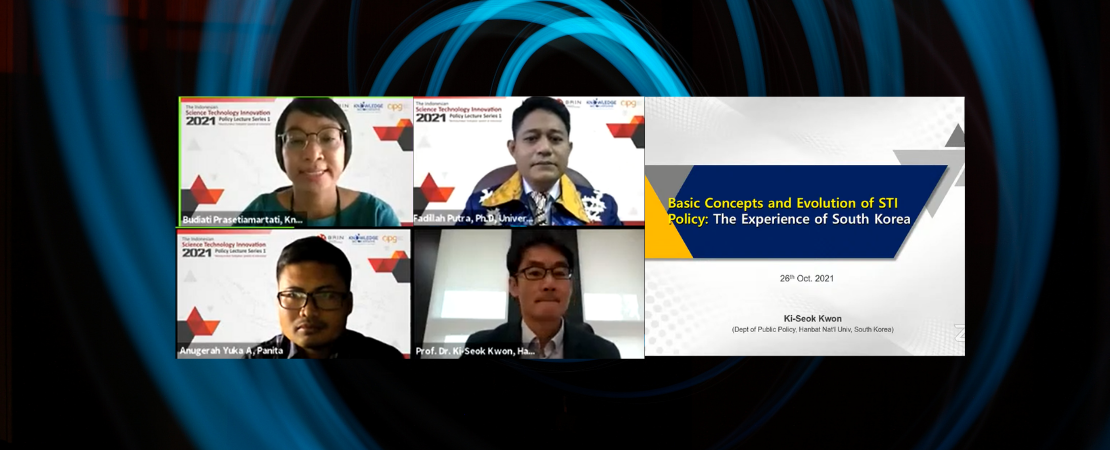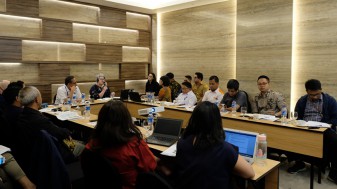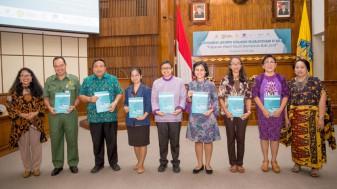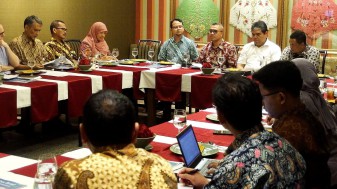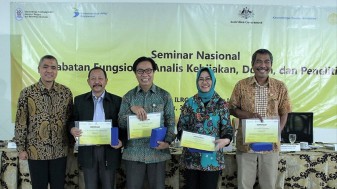Research and development in the fields of science, technology, and innovation are keys to a country as it grows into a developed nation. Therefore, the policy ecosystem which is based on science, technology, and innovation must be continuously developed. In fact, this should be setup as high priority by policy makers.
This statement was expressed in the webinar “The Indonesian Science Technology Innovation (STI) Policy Lecture Series I-2021: Science, Technology, and Innovation Policy Concepts” held on Tuesday (26/10/2021). This event was organized by Knowledge Sector Initiative, the National Research and Innovation Agency (BRIN), and the Center for Innovation Policy and Governance (CIPG). The speakers in this webinar were Prof. Dr. Ki-Seok Kwon from the Department of Public Policy at Hanbat National University, South Korea, and Fadillah Putra PhD from the Faculty of Administrative Sciences, Universitas Brawijaya, Malang.
In his presentation, Ki-Seok Kwon said that innovation was very important to the development of a nation. He gave an example of South Korea, which was once a poor country before transforming into a developed one, thanks to innovation. According to him, the basic element of innovation is affordable technology that and has been successfully accepted in the market. Without success in the market, he added, the technology could not be categorized as an innovation.
Kwon also outlined several theories and histories of innovation. In the 1950s, the theory was known as The Technology Push Theory. It emphasized the need to integrate studies, research, and technology to develop products that could sell in the market. Then, in the 1960s, the Market Pull Theory became known, and market’s needs started to inform development of products. In the 1970s, The Coupling Innovation Process Theory which combined the two previous theories became popular.
"For example, the public's increasing need for accessible communication has driven the emergence of mobile phone technology, which in turn led to the development of various mobile phone series to meet the market demands," said Kwon.
In South Korea, added Kwon, ongoing is the process and evolution of innovation. A concept that he called the national innovation system is currently being developed. This system integrates a number of elements, such as communication infrastructure, market conditions, education and training systems, and government regulations.
According to him, in the 1950s, Korea was known as a low-income country in Asia, even lower than those in African. At that time, the Korean government was facing the challenge of alleviating poverty among its population. The situation was aggravated by the absence of adequate natural resources necessary to promote industrialization.
“Our country's strategy was to look for resources, technology and markets; develop a human resource-based strategy; and to promote industrialization by prioritizing innovation that does more than just imitating things. As a result, the South Korean economy has grown dramatically. As an illustration, in 1960 the gross domestic product (GDP) per capita was 79 US dollars, but in 2010 it skyrocketed to 20,753 US dollars,” said Kwon.
Kwon added that a number of conditions for achieving success in innovation include of a government leadership, and that of CEOs in tech corporations, and policies and budget support. Also contributing were factors like: development of market-based technology, priorities on production capabilities over technological novelty, and utilization of global infrastructure networks. All of this can work well if supported by skilled human resources, technology development, and improved education system that mainstreams innovation.
“In conclusion, in both developed and developing countries, research and development investment is constrained by a lack of human resources, rather than a budget constraint. In Korea, the government invests a lot in the education sector and human resource development,” said Kwon.
Meanwhile, Fadillah Putra added, Indonesia already has a 2017-2045 National Research Master Plan as stipulated in Presidential Regulation Number 38 of 2018. Under this regulation, Indonesia lays out a vision of promoting its competitiveness and strengthening its sovereignty based on science and technology. Its mission is to create an innovative Indonesian society based on science and technology; and create a research-based global competitive advantage.
“However, Indonesia still needs the so called epistemic governance. This is not only true for Indonesia, but also a global demand. The ninth goal of the Sustainable Development Goals (SDGs), point five, constitutes efforts to promote research and development, strengthen technological capabilities in all industrial sectors, especially in developing countries, until 2030. It is necessary to promote innovation and increase the number of researchers per 1 million population and increase the research budget in the public (government) and private sectors," said Fadillah.
Furthermore, Fadillah explained that epistemic governance requires a number of conditions, such as good quality of higher education. Discussing quality higher education requires a paradigm shift from exploratory theory to innovation-based research, as well as better management of the institutions. According to him, South Korea really supports and facilitates the ideas and innovations proposed by lecturers or researchers at universities. In Indonesia, not all universities provide such support and facilities.
"In addition to quality education, knowledge production and policy learning are also required. For knowledge production, the Indonesian government has just formed the National Research and Innovation Agency (BRIN) so that the knowledge production process can be maximized and science and technology could be bridged with public policies," said Fadillah.
Meanwhile, related to policy learning, it is necessary to create a democratic governance that prioritizes scientific evidence rather than political interest. When science and politics are more attached, then both will learn from each other. Thus, politicians will be aware that the decisions made must be based on science or scientific. On the other hand, science must also be aware that science and technology is the result of political contestation. "Research funding must be widely provided from the central administration to the regions so an enabling ecosystem for the growth of science and technology and innovation can be established," he said.
The Indonesian STI Policy Lecture Series aims to make efforts to communicate and disseminate science and technology issues and policies to the wider community in Indonesia. The communication and dissemination model of this activity is held periodically and continuously. This discussion series involves the government, academia, policy research institutions, the private sector and other civil society/community organizations to act as resource persons and active participants. (*)

